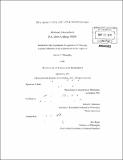Situating language and consciousness
Author(s)
Almotahari, Mahrad
DownloadFull printable version (6.527Mb)
Other Contributors
Massachusetts Institute of Technology. Dept. of Linguistics and Philosophy.
Advisor
Robert C. Stalnaker.
Terms of use
Metadata
Show full item recordAbstract
Language and consciousness enrich our lives. But they are rare commodities; most creatures are language-less and unconscious. This dissertation is about the conditions that distinguish the haves from the have-nots. The semantic properties of a natural language expression are determined by conventions governing the way speakers use the expression to communicate information. The capacity to speak a language involves highly specialized (perhaps even modular) cognition. Some authors think that one cannot consistently accept both views. In Chapter 1 ('Content and Competence') I explain why one can. According to the convention-based theory of content determination, propositions are fit to be the contents of both thought and speech. Recently, this view has been challenged. The challenge exploits a series of observations about what it takes to understand semantically incomplete sentences. In Chapter 2 ('Speaker Meaning in Context'), I explain how the challenge can be met. Physicalists seem to owe an explanatory debt. Why should psychophysical relations appear contingent? In Chapter 3 ('There Couldn't Have Been Zombies, but it's a Lucky Coincidence That There Aren't') I pay the debt on their behalf. My explanation proceeds in three steps. First, I observe that there are necessary coincidences, or accidents. Second, I show that traditional epistemological arguments for dualism merely establish that phenomenal states and corresponding physical states are accidentally, or coincidentally, related. Finally, I suggest that inattention to the distinction between coincidence/accidentality and contingency results in frequent equivocation. Thus the disposition to (correctly) judge that psychophysical relations are coincidences manifests itself as a disposition to (incorrectly) judge that psychophysical relations are contingent. In Chapter 4 ('Zombies are Inconceivable') I deny that psychophysical relations appear contingent. The chapter begins with an argument to the effect that zombies cannot be coherently conceived. I then consider and reject various ways of resisting the argument.
Description
Thesis (Ph. D.)--Massachusetts Institute of Technology, Dept. of Linguistics and Philosophy, 2011. Cataloged from PDF version of thesis. Includes bibliographical references (p. 98-104).
Date issued
2011Department
Massachusetts Institute of Technology. Department of Linguistics and PhilosophyPublisher
Massachusetts Institute of Technology
Keywords
Linguistics and Philosophy.